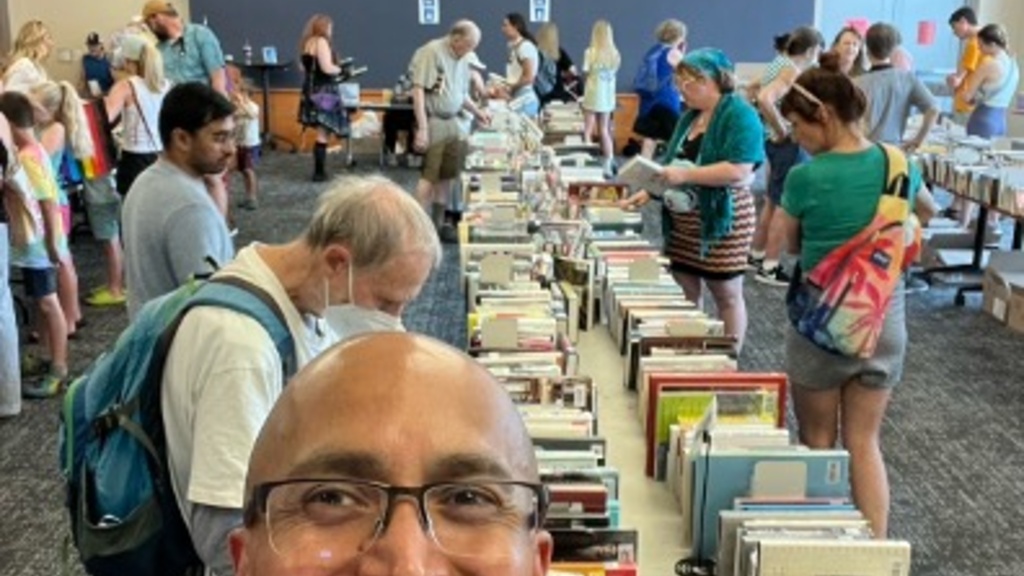Upcoming Events

Beyond a Chilling Effect: Direct Action for Academic Freedom
Thursday, April 3, 2025 4:00pm
a Faculty First Responders Workshop
sponsored by POROI, Iowa’s Project on Rhetoric of Inquiry
At a time when academics are finding their work hyper-surveilled, banned from funding, or even scrubbed by AI, how can we vibrantly sustain our research, writing, and creative practice?
In this Faculty First Responders workshop, participants will learn concrete steps to support freedom of inquiry for themselves and others. Topics include digital security measures, reducing risk of extremist attacks...

The Swine Republic: A reading by Chris Jones at Prairie Lights Bookstore
Thursday, April 3, 2025 7:00pm
Come to Prairie Lights Books for a special Darwin Day reading by Chris Jones, author of The Swine Republic. Published in 2023 by local publisher Ice Cube Press and named a 2024 "Great Reads from Great Places" book by the Library of Congress, The Swine Republic provides extensive research and reportage on the truth behind Iowa's infamously poor water quality, which you "...won't get ... from Iowa’s agricultural and political leaders." (icecubepress.com) Bill McKibben, author of The End of Nature...

Webinar: Exploring Anne Frank & Difficult Life Stories
Friday, April 4, 2025 10:00am to 12:00pm
Discover how Anne Frank’s story continues to shape conversations on empathy, education, and human rights in a compelling webinar featuring scholars from across the U.S.
Join the University of Iowa (UI) Anne Frank Initiative, an International Programs affinity group, on Friday, April 4, 2025, at 10 a.m. (CDT) as they host an insightful and engaging webinar featuring several esteemed authors from the groundbreaking book, Exploring Anne Frank and Difficult Life Stories (Routledge, 2025).
Hear...

Mutations and Permutations of Care: Graduate Conference
Friday, April 4, 2025 12:00pm to 5:00pm
Pagination
Spacer
Upcoming Application Deadlines
Upcoming Application Deadlines
News

Humanities Without Walls Externship Program Fosters Career Diversity, Community Collaboration
At some point, every student pursuing a graduate degree in the humanities has been asked, “So you're going to be a professor?” Humanities PhDs and MAs are often seen as hyperspecialized degrees useful only in the realm of academia—but in fact, the analytical and communication skills, as well as the broad understanding of culture attained through high-level study of the humanities, sets students up for success in a variety of careers, especially in the nonprofit sector. As globalization and rapid technological advancements are transforming the job market and accelerating its pace of change, it’s essential that graduate students be prepared to apply their skills in unexpected ways. University faculty, however, are not typically trained to guide these students toward meaningful, productive careers outside of academia.

Obermann Center Invites International Applicants for Residential Fellows Program
The Obermann Center is thrilled to announce that it is expanding its residential fellowship program to accept international researchers and artists. Fellowships offer dedicated space, time, and funding for scholars and artists based outside of the United States to develop collaborations and pursue independent work at the University of Iowa. Up to eight international fellowships will be granted every academic year, and fellows will receive a $2,000 stipend, office space at the Obermann Center, access to University of Iowa libraries, and other benefits.

Global connections: How international faculty shape Iowa’s future
On September 26, 2024, International Programs hosted a webinar focused on international faculty success in international scholarship and creative work as a part of the Cultivating Success: A Global Faculty Initiative series. Obermann Center director Luis Martín-Estudillo joined a distinguished panel of UI faculty experts to offer valuable insights into navigating the complexities of academia as an international faculty member at Iowa.

Introducing Counterpoint, the Obermann Center's Newest Series
This October, the Obermann Center is thrilled to present the inaugural event in our new annual public conversation series, Counterpoint. These events will highlight a University of Iowa scholar with a long career of making critical contributions to their field, placing them in dialogue across the disciplines with another scholar from a different yet complementary field.

Sorting Through Scholarship
Three months ago, I stepped into the Obermann Center’s library for the first time. My task was simple, if sizeable: I needed to organize the ~600 volumes in the collection by the end of the summer.
As a student in Iowa’s School of Library & Information Science, I was excited for my first solo library project. I’ve been interested in academic librarianship, scholarly communications, and research support for a long time. However, I knew I would have to approach the work strategically and manage my time well in order to succeed.
Our goal was to transform the library into a showcase for the works of Obermann scholars. But we also own many books that are unrelated to Obermann, and all of our books were intermingled without regard for subject, date, or author. After about thirty minutes of pacing up and down the library on my first day, I decided I was going to take every book off the shelf.
Lights, Camera, Action!
During their Obermann Interdisciplinary Research Grant (IDRG) in summer 2024, screenwriter Dean Bakopoulos (Cinematic Arts) and drama scholar Jennifer Buckley (English & Theatre Arts) wrote the pilot for a new historical TV miniseries: Anton & Olga.
The show, which Bakopoulos and Buckley plan to pitch to producers early next year, follows revolutionary playwright Anton Chekhov, actress Olga Knipper, and their colleagues at the newly-established Moscow Arts Theater (MAT) through personal, political, and artistic upheaval at the end of the nineteenth century. By exploring the creative clashes and collaborations that fueled Chekhov and the MAT, Bakopoulos and Buckley aim to reintroduce modern audiences to an important part of theatrical history. “So many of our ideas of what counts as ‘good acting’ come from them [the MAT],” explains Buckley, “especially from their co-founder, Konstantin Stanislavski, whose ‘system’ still gets taught today in acting programs. Our demands for nuance, subtlety, and emotional truth are all founded on their work.”
Pagination




